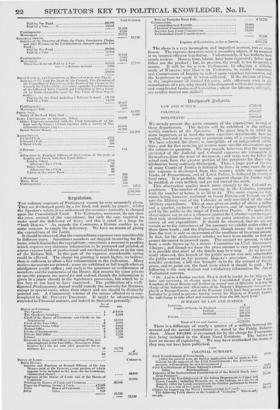litaittation.
THE ordinary expenses of Parliament cannot be very accurately given. They are discharged partly by a fee fund, and partly by grants ; whilst the Speaker's salary, if we understand the accounts correctly, is charged upon the Consolidated Fund. The Estimates, moreover, do not state the gross amount of the expenditure, but only the sum required to make good the deficiency of fees ; and this is voted in a lump for "both Houses." As regards the Commons, a Return enables us in some measure to supply the deficiency. We have no means of giving the expenditure of the Lords. It should be observed, that the extraordinary expenses vary considerably in different years. Sometimes members are sluggish in moving for Re- turns, which diminishes the expenditure; sometimes a measure is pending which requires very elaborate information to be procured and printed, at a large expense both of' professional and mechanical labour, as in the case of the Reform Bill. In this part of the expense, considerable saving could be effected. The charge for printing is much higher, we believe, than is sufficient to allow a fair refintneration to the tradesman. Many useless documents are printed ; many are exhibited at full length when an abridgment would suffice ; and such is the ignorance or recklessness of members and the supineness of the House, that returns for some private or specific purpose are moved for and ordered, though the information is given in a paper already in the legislator's possession, but which be is too lazy or too busy to have examined. The publication of a well- digested Parliamentary Annual would remedy the necessity for Returns, except in special cases, when their object and use should be distinctly pointed out. A Commercial volume of the nature alluded to is con- templated by Mr. POULETT THOMSON. It might be advantageously extended to Financial matters, and indeed to Statistics generally.
No. of rersons. 1831.
Ilona OF LORD. Unknown.
BOTR IIOUsES.
Salaries and Pensions of Retired Officers of the two Houses,paid at the Treasury (some portion of which appears to be included in the items for the Commons, enumerated above) 42,000 Expenses of the Home of Lords and of the House of Commons ., 22,000 Printing for 'louses of Lords and Commons 56,600 Paper for Printing, House of Lords £3.309 Ditto House of Commons 15,087 Ditto - Votes 843 19,239 - 75,239 HOUSE OF COMMONS.
The Speaker 1 £ 6.000 The Speaker's Secretary 1 2,223
Clerk of the House of Commons and Clerks in his Department 4 10,278 Clerk of the Fees Office 6 3,202 Committee Clerks Office 16 9,642
Journal Office s 9,076
Clerks of Ingrossments 5 1,326 Private Bill Office 4 2,130 Library 2 700
Sergeant at Arms, and Officers (consisting of the per- sons employed in the Vote Office, Messengers, Door- keepers, &c.) the net sum after payments for as-
sistance, &.c 16 14,705 - X 63 59,282 Fees on Turnpike Road Bills X 11,73I COMMISSIoNs.
Commissioners of Records 10,000
Charities' Commissioners 12,520 Superior Law Court Commissions 15,000 Ecclesiastical Court Commissioners - - 37,520 Expense of Legislation, so far as known £247,772
The above is a very incomplete and imperfect account, but ex angle leonem. The expense, however, were a secondary object, if by means of it we secured efficient legislation. Unfortunately, it has hitherto been nearly useless. Money, time, labour, have been expended ; folios upon folios are the product ; but, in practice", the result is too frequently a mouse. It will be for a new Parliament, by adopting a different mode of WORKING THE HOUSE 01 COMMONS, to enable Committees and Commissions of Inquiry to collect more complete information, and the Legislature to apply it when collected. If the division of labour, in the employment of trained labourenc, adds efficiency even in the manufacture of a pin, why should it be dispensed with in the responsible and complicated business of legislation ; where the labourers, unhappily, are neither trained nor skilful ?



















































 Previous page
Previous page